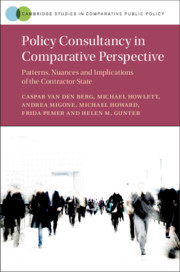 Policy Consultancy in Comparative Perspective
Policy Consultancy in Comparative Perspective Book contents
- Policy Consultancy in Comparative Perspective
- Cambridge Studies in Comparative Public Policy
- Policy Consultancy in Comparative Perspective
- Copyright page
- Contents
- Figures
- Tables
- Author Biographies
- Acknowledgements
- Abbreviations
- 1 Policy Consultancy in Comparative Perspective
- 2 Consultancy in the UK Government: Modernizing Privatism
- 3 Policy Consulting in the USA: Significant but in Decline?
- 4 Entrenched and Escalating: Policy-Relevant Consulting and Contracting in Australia, 1987–2017
- 5 From Corporatist to Contractor State? Policy Consulting in the Netherlands
- 6 Policy Consultants for Substance and Process: A Review of the Supply and Demand for Canadian Policy Consulting
- 7 Swedish Government Agencies’ Hiring of Policy Consultants: A Phenomenon of Increased Magnitude and Importance?
- 8 Conclusion: Policy Consulting in Comparative Perspective
- Book part
- References
- Index
4 - Entrenched and Escalating: Policy-Relevant Consulting and Contracting in Australia, 1987–2017
Published online by Cambridge University Press: 09 December 2019
- Policy Consultancy in Comparative Perspective
- Cambridge Studies in Comparative Public Policy
- Policy Consultancy in Comparative Perspective
- Copyright page
- Contents
- Figures
- Tables
- Author Biographies
- Acknowledgements
- Abbreviations
- 1 Policy Consultancy in Comparative Perspective
- 2 Consultancy in the UK Government: Modernizing Privatism
- 3 Policy Consulting in the USA: Significant but in Decline?
- 4 Entrenched and Escalating: Policy-Relevant Consulting and Contracting in Australia, 1987–2017
- 5 From Corporatist to Contractor State? Policy Consulting in the Netherlands
- 6 Policy Consultants for Substance and Process: A Review of the Supply and Demand for Canadian Policy Consulting
- 7 Swedish Government Agencies’ Hiring of Policy Consultants: A Phenomenon of Increased Magnitude and Importance?
- 8 Conclusion: Policy Consulting in Comparative Perspective
- Book part
- References
- Index
Summary
Chapter 4 on Australia presents a pioneering, quantitative analysis of the summary details of consultancies and other contracts over the past three decades, as these were listed in mandatory reporting systems of the national government. Using text analysis and keyword searches, the chapter focuses on consultancies and other contracts that appeared to be oriented, or at least relevant, to policy matters and programme content, as distinct from ‘neutral’ corporate services. In contrast to a reduction in the level of in-house staffing, it reveals strong long-term growth in spending on these policy-relevant contracts across each of the three decades. It also establishes that this overall pattern of growth was replicated right across Commonwealth departments. In regard to market share on the supply side, it finds a polarized distribution in each of the three decades: a corporate end where a very small proportion of suppliers get much of the spending, and a huge array of sundry operators undertaking very small amounts of work. It argues that the long-term market share of successful consultants and contractors put them in a position to influence many aspects of programme development.
- Type
- Chapter
- Information
- Policy Consultancy in Comparative PerspectivePatterns, Nuances and Implications of the Contractor State, pp. 85 - 130Publisher: Cambridge University PressPrint publication year: 2019
